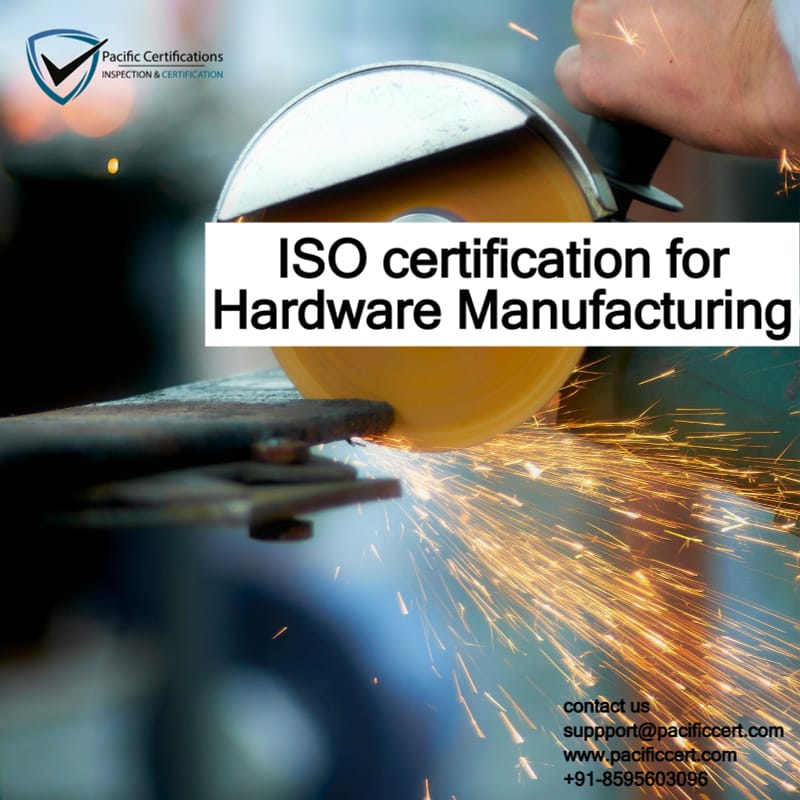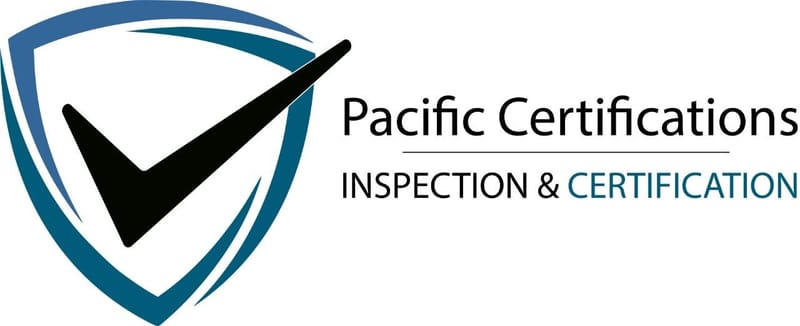ISO Certifications for Hardware Manufacturing Industry, Requirements and Benefits

ISO certifications for Hardware Manufacturing
ISO certifications are critical in the hardware manufacturing sector, ensuring that products are produced with high standards of quality & safety. ISO 9001 for quality management helps manufacturers regularize their production processes, minimize defects, and maintain consistency. ISO 14001 for environmental management also plays a significant role by helping manufacturers reduce their environmental impact, through better resource management and waste reduction. Additionally, ISO 45001 for occupational health and safety protects workers by fostering safer work environments.
In the competitive world of hardware manufacturing, delivering reliable, high-quality, and safe products is not enough—companies must also demonstrate strong environmental stewardship, worker safety, and protection of intellectual property.
ISO certifications such as ISO 9001, ISO 14001, ISO 45001, and ISO/IEC 27001 provide a structured and globally recognized framework to achieve this. By adopting these standards, hardware manufacturers can streamline their processes, reduce defects, manage risks, and earn greater market credibility.
By adopting these ISO standards, hardware manufacturers can improve their efficiency and also increase their market credibility.
Below are some of the key ISO standards applicable to hardware manufacturing companies and how they contribute to various aspects of the business.
Standard | Certifiable? | Relevance / Focus |
|---|---|---|
ISO 9001 (Quality Management) | Yes | Core quality system: design control, production processes, testing, traceability |
ISO 14001 (Environmental Management) | Yes | Environmental impacts: materials, waste, energy, recycling, emissions |
ISO 45001 (OHS Management) | Yes | Safety of workers handling equipment, chemicals, mechanical hazards |
ISO/IEC 27001 (Information Security) | Yes | Protect design data, IP, firmware, client information, supplier data |
IATF 16949 / Automotive QMS | Yes (for hardware in automotive supply chain) | Additional rigor for automotive parts, quality, failure mode control |
ISO 13485 (Medical Devices) | Yes (if hardware is medical device) | Quality requirements specific to medical hardware, regulatory compliance |
ISO 50001 (Energy Management) | Yes | Energy optimization, cost reduction, carbon footprint control |
ISO 22301 (Business Continuity) | Yes | Continuity planning for plant outages, supply disruptions, disaster recovery |
ISO 9001: Quality Management Systems (QMS)
ISO 9001 is the most widely recognized standard for quality management systems globally. It provides a framework for companies to ensure that they consistently produce products that meet customer and regulatory requirements.
ISO 14001: Environmental Management Systems (EMS)
ISO 14001 focuses on environmental management, helping hardware manufacturers to reduce waste, improving energy efficiency, and managing the environmental impacts of materials and processes.
ISO 45001: Occupational Health and Safety Management Systems
ISO 45001 aims to reduce workplace risks and create better, safer working conditions. This is crucial in hardware manufacturing, where there can be significant risks associated with machinery, chemicals and other factors.
ISO 27001: Information Security Management Systems (ISMS)
ISO 27001 is relevant for hardware manufacturing companies that handle sensitive data, helps organizations manage the security of assets such as financial information, intellectual property, employee details or information entrusted by third parties.
ISO 13485: Medical Devices - Quality Management Systems
For companies involved in the manufacture of hardware for medical devices, ISO 13485 is a specific standard that outlines requirements for a quality management system where an organization needs to demonstrate its ability to provide medical devices and related services.
IATF 16949: Quality Management System for Automotive Production
IATF 16949 is recognized globally and is based on ISO 9001 with additional requirements specific to the automotive industry. It focuses on continuous improvement, defect prevention, and the reduction of variation and waste in the supply chain.
Click here to find out more applicable standards to your industry
If you need support with ISO certification for your hardware manufacturing business, you can contact us at [email protected] or +91-8595603096
Implementation and Certification Process
For hardware manufacturing companies looking to obtain ISO certifications, the process involves:
- Gap Analysis: Identifying the current state of your processes and how they align with the requirements of the desired ISO standard.
- Planning and Implementation: Developing a plan to address gaps and implementing changes to meet the standard's requirements.
- Internal Auditing: Conducting internal audits to ensure ongoing compliance and identify areas for improvement.
- Certification Audit: An external audit performed by a certification body, like us, Pacific Certifications, to verify compliance with the standard.
- Continuous Improvement: After certification, companies should focus on continual improvement to maintain compliance.
For hardware manufacturing companies, obtaining ISO certifications requires a commitment to continuous improvement and a focus on quality and efficiency.
What are the Challenges & Considerations?
The cost (capital, staff, audit, tools) of implementing multiple standards can be significant.
Integrating multiple systems (quality, environment, safety, security) without duplication or conflict requires careful planning.
Maintaining certificates over time requires ongoing audits, updates, staff turnover, adaptation to new standard versions.
Hardware field changes (design changes, firmware updates) complicate traceability and control.
Calibration and test equipment must be meticulously maintained — failures here can ripple into quality issues.
Cybersecurity for connected hardware is a moving target — vigilance is needed.
Some specialized standards (IATF, ISO 13485) have extra stringent requirements — ensure readiness before committing to them.
What are the requirements & benefits of ISO certifications of Hardware Manufacturing Sector?
ISO certifications for hardware manufacturing businesses involve a series of standards that ensure products and services are safe and of good quality. Below are the key requirements companies need to follow to achieve the most applicable standards for Hardware manufacturing:
Generic Requirements (Across All Standards)
Policy & Objectives — Define leadership-approved policies for quality, environment, safety, information security, and measurable goals.
Risk Assessment & Treatment — Identify and manage risks (product failures, design defects, environmental hazards, data breaches, supply chain interruptions).
Process Documentation & Control — Document critical processes (design, prototyping, manufacturing, testing, selecting suppliers, maintenance).
Training & Competence — Ensure employees, engineers, technicians understand relevant standards, tools, safety, security, and QA practices.
Monitoring, Measurement & Analysis — Collect metrics (defect rate, energy use, nonconformities, incidents, security logs).
Internal Audits — Independently verify conformance, detect gaps, report corrective actions.
Management Review — Leadership reviews system performance, risk status, resource needs, improvement opportunities.
Corrective & Preventive Actions — Respond to nonconformities, root cause analysis, implement preventive changes.
Continual Improvement — Use feedback, audit findings, metrics to refine systems and processes.
Legal & Regulatory Compliance — Identify applicable laws (environmental, safety, product regulations, data protection) and ensure conformity.
Records & Evidence — Maintain logs, test reports, audit records, training records, design change logs, supplier records.
Benefits of ISO Certifications for Hardware Manufacturing
- ISO standards can differentiate a company from its competitors, making it more attractive to customers.
- Many markets require ISO certification as a prerequisite for doing business, especially in regulated industries.
- Implementing ISO standards helps to improve operations, reduce waste, and optimize resource use.
- By ensuring consistent quality and meeting customer expectations, companies can enhance customer loyalty and retention.
- ISO certifications help companies comply with regulatory requirements and manage risks more effectively.
- Standards like ISO 14001 encourage companies to adopt environmentally sustainable practices, reducing their environmental impact and contributing to corporate social responsibility.
In summary, obtaining ISO certifications offer hardware manufacturing companies a framework for excellence in quality management, environmental responsibility, occupational health and safety, and information security. These certifications ensure compliance with international practices and also improve efficiency, marketability and customer trust.
Pacific Certifications is accredited by ABIS, in case you need support with ISO certification for your hardware manufacturing business, please contact us at [email protected] or +91-8595603096.
Post by: Ashish

Read more: ISO certification for Gardening Services companies and ISO applicable standards
